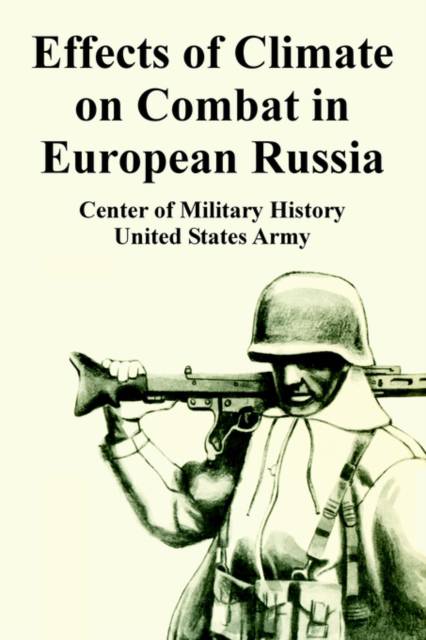
- Retrait gratuit dans votre magasin Club
- 7.000.000 titres dans notre catalogue
- Payer en toute sécurité
- Toujours un magasin près de chez vous
- Retrait gratuit dans votre magasin Club
- 7.000.0000 titres dans notre catalogue
- Payer en toute sécurité
- Toujours un magasin près de chez vous
Effects of Climate on Combat in European Russia
Center of Military History, United States Army
Livre broché | Anglais
40,45 €
+ 80 points
Description
The purpose of this study is to describe the climatic conditions encountered by the German armed forces during four years of struggle in European Russia. To this end the climate of the various regions is described together with its effects on men and equipment, combat and supply. Parts Two, Three, and Four are concerned with European Russia south of the Arctic Circle; Part Five treats of European Russia north of the Arctic Circle. The study emphasizes the lessons learned and improvisations employed to surmount difficult situations. A Western European army fighting in Russia is faced with conditions entirely different from those to which it is accustomed, conditions rooted in the peculiarities of Russia and its people. The most unusual characteristic of the country is the climate, which affects terrain and vegetation and determines living conditions in general. The climate leaves its mark upon the Russian and his land, and he who steps for the first time on Russian soil is immediately conscious of the new, the strange, the primitive. The German soldier who crossed into Russian territory felt that he entered a different world, where he was opposed not only by the forces of the enemy but also by the forces of nature. Nature is the ally of the Russian Army, and the struggle against this alliance was a severe test for the Wehrmacht, exacting great sacrifices. To conquer the raging elements of nature was the more difficult because their fury and effect were not fully recognized by the Germans, who were neither trained nor equipped to withstand them. The German command had been under the impression that the Red Army could be destroyed west of the Dnieper, and that there would be no need for conducting operations in cold, snow, and mud. This study was prepared by a committee of former German generals and general staff officers under the supervision of the Historical Division, EUCOM. The material, based on the personal experiences of the principal author and his associates, was written largely from memory, with some assistance from diaries, earlier studies, and documents. All the German officers involved had extensive experience on the Eastern Front during the period 1941-45. The principal author, for example, commanded in succession a panzer division, a panzer army, and an army group.
Spécifications
Parties prenantes
- Auteur(s) :
- Editeur:
Contenu
- Nombre de pages :
- 96
- Langue:
- Anglais
Caractéristiques
- EAN:
- 9781410223654
- Date de parution :
- 08-06-05
- Format:
- Livre broché
- Format numérique:
- Trade paperback (VS)
- Dimensions :
- 152 mm x 229 mm
- Poids :
- 149 g

Les avis
Nous publions uniquement les avis qui respectent les conditions requises. Consultez nos conditions pour les avis.






